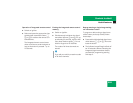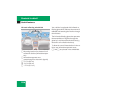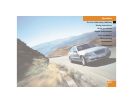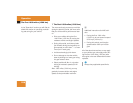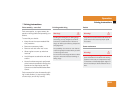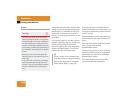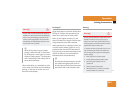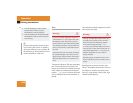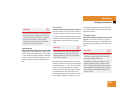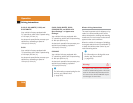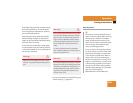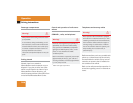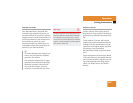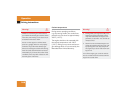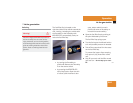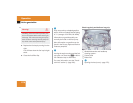
263
Operation
Driving instructions
Hydroplaning
Depending on the depth of the water layer
on the road, hydroplaning may occur, even
at low speeds and with new tires. Reduce
vehicle speed, avoid track grooves in the
road and apply brakes cautiously in the
rain.
Tire traction
The safe speed on a wet, snow covered or
icy road is always lower than on a dry road.
You should pay particular attention to the
condition of the road whenever the outside
temperatures are close to the freezing
point.
Mercedes-Benz recommends M+S rated
radial-ply tires with a minimum tread depth
of approximately
1
⁄
6
in (4 mm) on all four
wheels for the winter season to ensure
normal balanced handling characteristics.
On packed snow, they can reduce your
stopping distance in compared to summer
tires. Stopping distance, however, is still
considerably greater than when the road is
not covered with snow or ice. Exercise ap-
propriate caution.
Tire speed rating
Regardless of the tire rating, local speed
limits should be obeyed. Use prudent driv-
ing speeds appropriate to prevailing condi-
tions.
Warning! G
Do not drive with a flat tire. A flat tire affects
the ability to steer or brake the vehicle. You
may lose control of the vehicle. Continued
driving with a flat tire or driving at high
speed with a flat tire will cause excessive
heat build-up and possibly a fire.
Warning! G
If ice has formed on the road, tire traction
will be substantially reduced. Under such
weather conditions, drive, steer and brake
with extreme caution.
Warning! G
Even when permitted by law, never operate
a vehicle at speeds greater than the maxi-
mum speed rating of the tires.
Exceeding the maximum speed for which
tires are rated can lead to sudden tire fail-
ure, causing loss of vehicle control and pos-
sibly resulting in an accident and/or serious
personal injury and possible death, for you
and for others.



